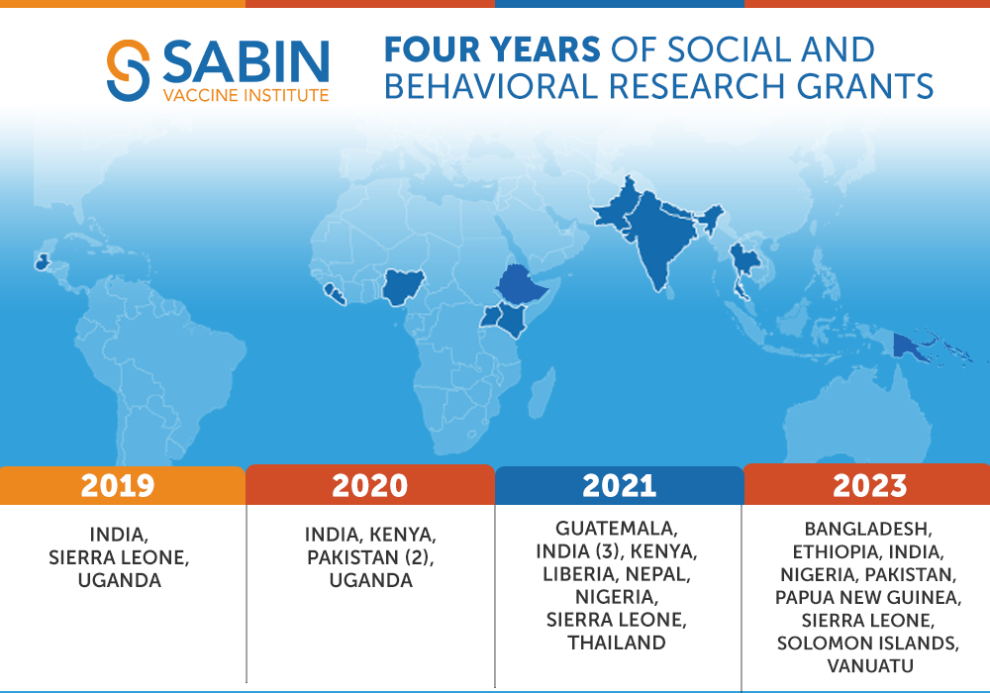Sabin Welcomes 7 New Partners into Its 2023-2024 Social and Behavioral Research Grants Program
The Sabin Vaccine Institute’s Vaccine Acceptance & Demand initiative is proud to announce funding for 7 grant partners awarded through its Social and Behavioral Research Grants Program. Projects will run from March 2023 through August 2024. Interdisciplinary teams will explore drivers of locally-led solutions to support vaccine acceptance, demand, and delivery of childhood routine and adult immunization.
The COVID-19 pandemic has negatively impacted global trends of routine childhood immunization, while also highlighting large, persisting deficits in adult (or life-course) vaccination. The most severe impact is being felt within low- and middle-income countries (LMICs). Data released by the World Health Organization (WHO) and UNICEF depict the largest sustained decline in childhood vaccinations in approximately 30 years. Recovery of this lost ground to reach unvaccinated or under-vaccinated children must be a global public health priority. Inequitable access to and widespread misinformation and hesitancy around COVID-19 vaccines has made clear that investment in life-course vaccination as key measures for future pandemic preparedness must also be a policy priority.
Understanding social and behavioral drivers of vaccination and effectively measuring the causes of low vaccine acceptance and demand across localized contexts is critical. The WHO’s Behavioral and Social Drivers (BeSD) of Vaccination framework is one tool developed to support immunization programs in measuring and addressing these factors. Social and behavioral data from the community-level can inform interventions designed to increase and sustain high coverage rates. Increasingly, the need to tailor these interventions with highly localized evaluations of these drivers and frameworks has become apparent.
In response to our 2023-2024 grant partner Call for Proposals, 134 eligible applications were received from institutions in over 40 countries. Central to the objectives of the 2023 partnerships and funding are efforts to develop and disseminate evidence-informed knowledge and solutions-based strategies focused on the following themes:
- Recovering lost gains in routine childhood immunizations as a result of the COVID-19 pandemic,
- Building effective life-course vaccination programs in a post-pandemic world, and
- Operationalizing the WHO BesD framework.
With a duration of 18 months, research-related activities for the selected projects will be initiated after local ethical approvals are obtained in the respective geographic settings. Research teams are interdisciplinary in nature, with Principal Investigators entrenched within both social and behavioral sciences and global/public health fields. These research tracks have been selected as approaches to generating and sustaining vaccination uptake in a more equitable way that includes under-immunized individuals, adjusts for stages of life, and accounts for the social and behavioral influences of country-level vaccination in a post-pandemic world.
Established in 2019, the Social and Behavioral Research Grants Program initially provided a mechanism to fund on-the-ground research to explore childhood and routine vaccination acceptance among communities in low- and middle-income countries. Its pilot year awarded up to $25,000 to three projects spanning ten-months in India, Sierra Leone, and Uganda. The program has since expanded, with research teams in this fourth cohort being awarded up to $70,000 over 18 months to support close-to-community research and interventions to improve vaccine acceptance, demand, and delivery.
The expansion of the timeline and funding amount is meant to support research teams in engaging with key stakeholders to disseminate critical insights and lessons learned from their work that may have impact on policy, programs, and practice in communities across the globe. Opportunities to amplify research teams’ expertise and work will be facilitated through Sabin’s Vaccine Acceptance & Demand Resource Hub, our Immunization Advocates and Boost Community programs, and key external partnerships supported by Sabin’s Vaccine Acceptance & Demand initiative. These opportunities allow for capacity and relationship building that connects grant partners’ research with implementers, decision-makers, and other researchers help improve global immunization.
Grant partners are also invited to join the Sabin-led interdisciplinary Vaccination Acceptance Research Network (VARN), a globally representative group of multidisciplinary academic researchers, social scientists, global health practitioners, immunization program professionals, and policymakers. Each team will be invited to participate in and present their research at the annual VARN conference following project close-out. Sabin’s Social and Behavioral Research Grants Program is also an entry point into Sabin’s Coalition of Grant Partners, which consists of all past and presently funded research teams. The first three cohorts of grant partners (2019, 2020-2021, 2021-2022) attended an inaugural coalition meeting in July 2022 in Dubai, U.A.E. where they had the opportunity to:
- Present on their research progress,
- Discuss challenges and opportunities within the vaccination acceptance, demand, and delivery research ecosystem,
- Participate in a strategic communications training,
- Network with researchers across the coalition, and
- Inform Sabin’s subsequent Call for Proposals.

Further introductions to the new cohort will be included as part of a three part thematic blog series, providing a deeper dive into each of the research tracks. We will highlight related projects’ social dimensions of investigation at multiple, nested levels of influence, and examine potential solutions to address those elements, contributing to evidence-based knowledge within the field of vaccine acceptance, demand, and delivery.
Featured Resources

We make vaccines more accessible, enable innovation and expand immunization across the globe.






